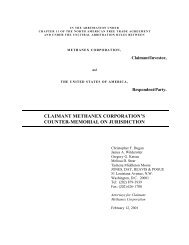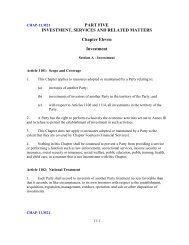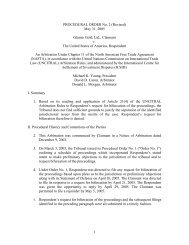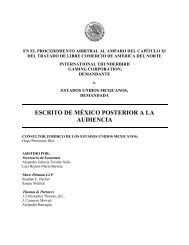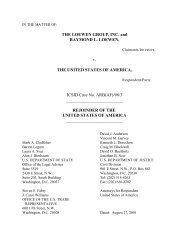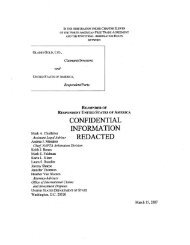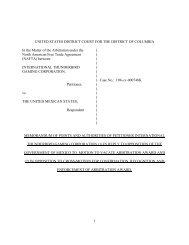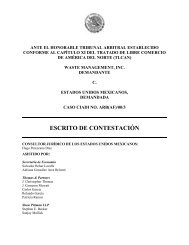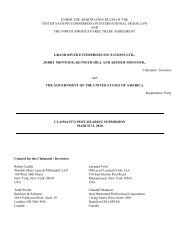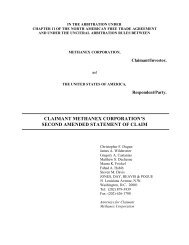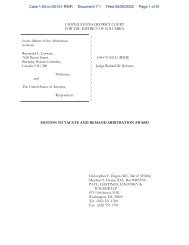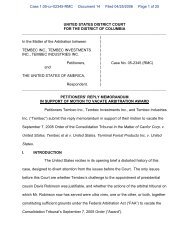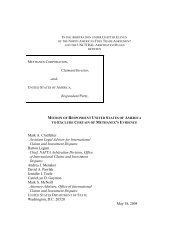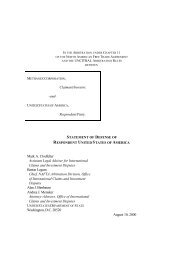GAMI INVESTMENTS, INC. - NAFTAClaims
GAMI INVESTMENTS, INC. - NAFTAClaims
GAMI INVESTMENTS, INC. - NAFTAClaims
Create successful ePaper yourself
Turn your PDF publications into a flip-book with our unique Google optimized e-Paper software.
of those obligations in a BIT that doesn't depend on whether there is<br />
discrimination. There is simply a requirement not to interfere in<br />
transfers by an investor, a foreign investor, regardless of whether there<br />
is an interference with transfers of domestic investors.<br />
Now, that point, of course, is going to be wholly lost in the<br />
Mexican view because a measure that interfered with all transfers by<br />
anyone would not refer to foreign investors. It would simply restrict<br />
them in the same way it restricted everyone else. It would have no<br />
relationship to foreign investors other than effect. And yet by the<br />
Mexican view, Article 1109, even as an affirmative obligation, simply<br />
gets reduced to--or at least even a state that is half-clever, and reduce<br />
it to simply a ban of discriminatory transfers.<br />
Then it goes on, and there are two exceptions provided in<br />
1109 in paragraphs (4) and (5) to the rule against limiting transfers.<br />
Because it's shorter, I'll read paragraph (5), which is--it says<br />
paragraph (3), which is one of the restrictions, "shall not be construed<br />
to prevent a party from imposing any measure through the equitable, nondiscriminatory,<br />
and good-faith application of its laws relating to the<br />
matters set out in paragraph (4)," which are things like bankruptcy,<br />
trading, and securities.<br />
Well, again, I ask the question. This paragraph simply makes<br />
no sense if these measures are not within the scope of Chapter 11 anyway.<br />
So there's no need to make another exception for them, and Mexico<br />
referred this morning to the principle of effectiveness. Part of the<br />
principle of effectiveness, as I recall--I hesitate to say this in front<br />
of people who teach, but it is that you can't reduce whole clauses or<br />
whole phrases of a treaty to a nullity or to give them no point. And yet<br />
this would give no point to these exceptions.<br />
We've provided a lot of other examples. I don't think I need<br />
to go on with them. As I say, we will be very happy to answer questions<br />
you have about the examples we've provided and any others you might have<br />
in mind.<br />
Let me close where Mr. Aguilar closed this morning. Mexico's<br />
interpretation of Article 1101 and the "relating to" standard would<br />
really rip a very large hole in NAFTA's protection. One of the trends of<br />
modern states--and I used to work for a big modern--well, sort of modern<br />
government. Governments--and this is certainly something that Mr.<br />
Lacarte will have experienced in the WTO. Governments are pretty good<br />
about writing their regulations in a way that can be highly restrictive,<br />
interfering, and so forth, without saying I'm trying to get the<br />
foreigners, I'm trying to get the foreign investors, I'm trying to get<br />
the foreign products, what have you. And one of the developments of<br />
international law over time is that Tribunals and the WTO Panels and so<br />
forth have no patience for the exercise that says, you know, this tax is<br />
non-discriminatory, anybody who produces shochu liquor will benefit from<br />
this tax break and it's just a coincidence that 99 percent of the<br />
production is Japanese and so forth.<br />
The fact is if you take away--if you apply a standard like<br />
"relating to" here, you will invite states to embark on a great course of<br />
restriction of investment. And while it may feel good when a state is<br />
defending its conduct in a particular dispute, where, after all, it's<br />
under tremendous pressure to try to avoid liability, it actually defeats<br />
the whole purpose for which the state engaged in the negotiation in the<br />
first place. There's a kind of an irony for governments. You go out and<br />
negotiate these treaties because you want to encourage investment, and<br />
that this is one way to encourage investment by protecting it. Well,<br />
then you go into the individual cases where you have to defend yourself,



